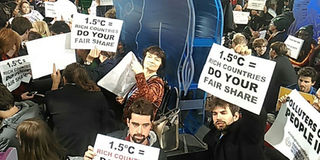World leaders rush to stop temperatures from increasing to 1.5 degrees

Activists protest outside the France Pavilion demanding for a sound climate change agreement. PHOTO | EUNICE KILONZO | NATION MEDIA GROUP
What you need to know:
- Droughts, especially in poor countries where subsistence farming is rain-fed, threaten already perilous food supplies.
- Outbreaks of cholera thrive under conditions of too much or too little water. Insects and other carriers of disease are exquisitely sensitive to variations in heat, humidity and rainfall.
- Climate change has already given dengue a vastly expanded geographical range and may do the same for malaria.
World leaders have a day to finalise on a climate change agreement released on Thursday that will ensure global temperatures do not increase to 1.5 degrees.
The rise in temperatures has been linked to huge risks for human health, food security and extinction of some communities.
Now, the World Health Organisation (WHO) believes “this isn’t just an agreement for saving the planet, it’s a significant public health treaty.”
The ongoing discussions that began on November 30 in Paris France are expected to lead to the signing of a new global agreement on limiting greenhouse gas emissions, which would kick in from 2020 when current commitments expire.
Director General WHO Margaret Chan says by limiting green gases emissions such as methane and carbon dioxide into the atmosphere, gases that trap heat into the earth’s atmosphere “will put in check climate sensitive infections.”
“The world is recklessly late in agreeing to a climate change, there are tens of thousands of deaths from cholera, dengue, heat waves and floods. This agreement should be about the people, we need to repeat the consequences of climate change on them,” she said on Thursday in Le Bourget, Paris.
Ms Chan said she was aware of climate sceptics, who believe climate change is a fad that might disappear with time.
She said by 2030, climate change will be causing an additional 250,000 deaths each year from malaria, diarrhoeal disease, heat stress and under-nutrition.
She added: “The Red alert in China over increased air pollution is a red alert to the whole planet. Pollution which traps warmth in the atmosphere is evidence of this problem. Whether we believe in it or not, it is our children who will suffer from climate change. I have a son and I look forward to seeing my grandchildren survive in this world.”
The alert, the highest possible warning level, was issued late on Monday and will last until midday on Thursday. It limits car use and some factories have been ordered to stop operations.
WHO estimates more than 7 million annual deaths globally can be attributed to air pollution.
Climate change, according to the health entity, is also causing tens of thousands of yearly deaths from extreme weather events like droughts and floods, storm surges, heat waves and wildfires.
The World Meteorological Organization says 2015 is already the hottest year since records began in 1880. Next year is predicted to be even hotter.





